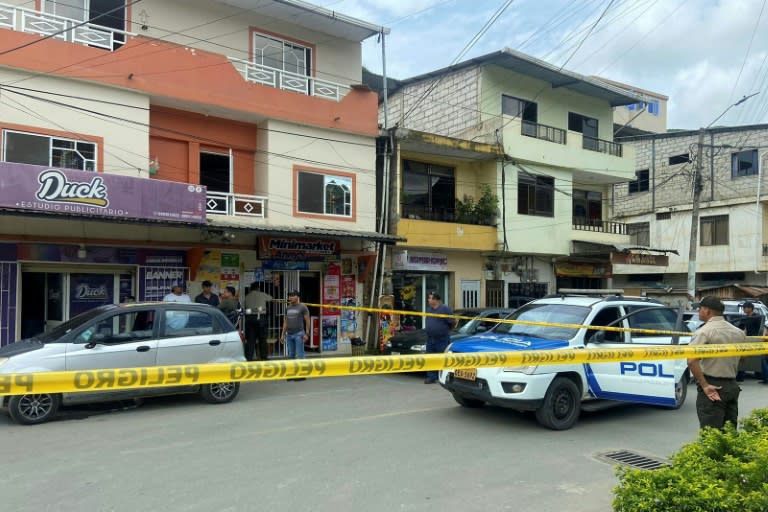Second Ecuadoran mayor killed ahead of anti-crime referendum: police

The mayor of a mining town in violence-riddled Ecuador was shot dead Friday, the second such killing in days ahead of a weekend referendum on tougher measures against organized crime, police said.
Jorge Maldonado, the mayor of Portovelo, "fell victim to gunshots that resulted in his death," police said on X, formerly Twitter.
He was gunned down by two attackers on a motorcycle.
Images seen by AFP showed the slain mayor lying on a sidewalk with a pool of blood around his head.
The bloodshed came in the midst of an energy debacle due to a severe drought, which has emptied reservoirs to alarming levels and left the nation grappling with blackouts of up to 13 hours.
President Daniel Noboa on Friday decreed a state of emergency to avoid "terrorist attacks" to the supply of electricity across the country.
Noboa had denounced that "sabotage" had caused power cuts, without identifying whom he believes was responsible.
Maldonado was the fifth Ecuadoran mayor assassinated in a year, and the third in less than a month.
Two days before his killing, the mayor of Camilo Ponce Enriquez in the southern province of Azuay, Jose Sanchez, was shot dead.
And last month, Brigitte Garcia, the 27-year-old mayor of coastal San Vicente, was found dead in a car along with the municipality's communications director, Jairo Loor. Both had suffered gunshot wounds.
The AME municipalities' association said in a statement the killings were "indicative of a serious security crisis" and demanded "immediate and decisive action" to guarantee the safety of the country's more than 200 other mayors.
Millions of Ecuadorans will cast ballots in a referendum on Sunday to decide whether or not to green-light stricter measures against organized crime in a country gripped by bloody gang wars.
Once a bastion of peace situated between major cocaine producers, the South American country has been plunged into crisis after years of expansion by the transnational cartels that use its ports to ship the drug to the United States and Europe.
- 'Internal armed conflict' -
Prosecutors, journalists and police have been among the victims of organized criminals with links to Mexican and Colombian cartels.
In January, Noboa declared a state of "internal armed conflict" against about 20 criminal groups.
That came after a spasm of violence sparked by the prison escape of a major drug lord, who has yet to be recaptured.
Since then, the military has been deployed in the streets and taken control of the country's prisons, where a string of gang riots in recent years has left some 460 people dead.
Since January last year, at least a dozen politicians have been killed in Ecuador, including presidential candidate Fernando Villavicencio, who was gunned down last August after leaving a campaign event.
Some 13.6 million of Ecuador's 17.7 million people are eligible to vote in Sunday's referendum.
They will be asked to give the go-ahead for measures such as allowing the deployment of soldiers to back up police outside of a state of emergency, boosting arms control and increasing sentences for terrorism and drug trafficking.
sp-pld/mlr/sst/tjj/des


